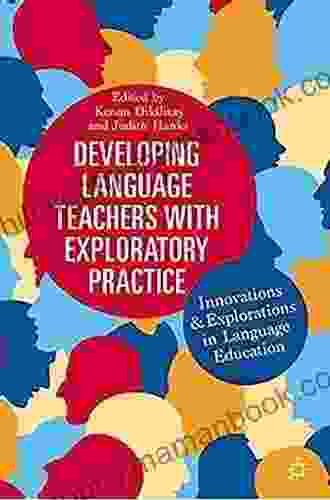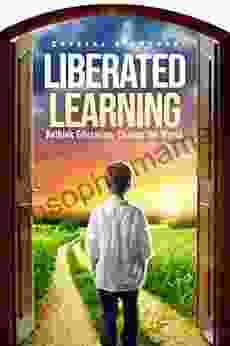Innovations and Explorations in Language Education: Pushing the Boundaries of Language Learning

The world of language education is undergoing a period of unprecedented innovation and exploration. Driven by technological advancements, changing learner needs, and a growing emphasis on personalized learning, educators and researchers are pushing the boundaries of how we learn and teach languages.
4.6 out of 5
| Language | : | English |
| File size | : | 7872 KB |
| Text-to-Speech | : | Enabled |
| Screen Reader | : | Supported |
| Enhanced typesetting | : | Enabled |
| Word Wise | : | Enabled |
| Print length | : | 242 pages |
In this article, we will explore some of the most exciting innovations and advancements in language education, highlighting the latest trends, technologies, and methodologies that are revolutionizing the way we approach language learning.
Immersive Virtual Reality (VR)
Virtual reality (VR) is transforming the way we learn and experience the world around us. In language education, VR is being used to create immersive and interactive learning environments that allow learners to experience a target language in a simulated real-world setting.
For example, learners can use VR to:
- Visit a virtual museum in Paris and interact with native French speakers
- Attend a virtual language class in Madrid and practice speaking Spanish with other learners
- Explore a virtual world where they can interact with people from different cultures and learn about their languages and customs
VR provides learners with a unique opportunity to experience a target language in a natural and immersive way, which can greatly enhance their learning outcomes.
AI-Powered Language Assistants
Artificial intelligence (AI) is another rapidly growing field that is having a major impact on language education. AI-powered language assistants can provide learners with personalized and adaptive learning experiences, helping them to improve their language skills in a more efficient and effective way.
Some of the features of AI-powered language assistants include:
- Personalized lessons and exercises based on the learner's individual needs and learning style
- Real-time feedback on pronunciation, grammar, and vocabulary
- Conversational practice with native speakers or AI-generated avatars
- Progress tracking and analytics to help learners monitor their progress and identify areas for improvement
AI-powered language assistants can be a valuable tool for learners of all levels, providing them with the support and guidance they need to succeed.
Immersive Learning
Immersive learning is an approach to language education that focuses on creating an environment where learners are fully immersed in the target language and culture. This can be achieved through a variety of methods, such as:
- Studying abroad
- Participating in language exchange programs
- Using immersive language learning apps and software
- Watching movies and TV shows in the target language
- Reading books and articles in the target language
Immersive learning can be a powerful way to improve language skills, as it allows learners to experience the language in a natural and authentic context.
Personalized Learning
Personalized learning is an approach to education that focuses on tailoring the learning experience to the individual needs and interests of each learner. In language education, personalized learning can be achieved through a variety of methods, such as:
- Using adaptive learning software that adjusts the difficulty of lessons based on the learner's progress
- Providing learners with choice in their learning activities and materials
- Offering one-on-one tutoring or small group instruction
- Creating learning plans that are tailored to the learner's goals and objectives
Personalized learning can help learners to make more progress in their language studies, as it allows them to focus on the areas that they need to improve the most.
Adaptive Learning
Adaptive learning is a type of personalized learning that uses technology to adjust the difficulty of learning materials based on the learner's progress. Adaptive learning software can track the learner's performance on various tasks and adjust the difficulty of the material accordingly.
This type of learning can be particularly beneficial for language learners, as it allows them to focus on the areas that they need to improve the most. Adaptive learning software can also provide learners with immediate feedback on their progress, which can help them to stay motivated and on track.
Gamification
Gamification is the use of game elements in non-game contexts. In language education, gamification can be used to make learning more fun and engaging. For example, learners can earn points for completing tasks, level up as they progress, and compete with other learners in language-learning games.
Gamification can be a powerful way to motivate learners and help them to make more progress in their language studies.
The Future of Language Education
The future of language education is bright. The innovations and advancements that are currently being developed are transforming the way we learn and teach languages. As technology continues to evolve, we can expect to see even more exciting and innovative approaches to language learning emerge in the years to come.
Here are a few predictions for the future of language education:
- VR and AR will become more widely used in language education, providing learners with even more immersive and interactive learning experiences.
- AI-powered language assistants will become even more sophisticated, providing learners with personalized and adaptive learning experiences that are tailored to their individual needs.
- Immersive learning will become more accessible, allowing more learners to experience the benefits of learning a language in a natural and authentic context.
- Personalized learning will become the norm, as educators and researchers continue to develop new ways to tailor the learning experience to the individual needs of each learner.
- Technology will continue to play a major role in language education, providing learners with new and innovative ways to learn and practice languages.
The future of language education is full of possibilities. With the continued development of new technologies and approaches, we can expect to see even more exciting and innovative ways to learn and teach languages in the years to come.
Innovations and explorations in language education are pushing the boundaries of how we learn and teach languages. From immersive VR experiences to AI-powered language assistants, we are seeing a wide range of new and innovative approaches that are transforming the language learning landscape.
As we continue to explore new ways to learn and teach languages, we can expect to see even more exciting advancements in the years to come. The future of language education is bright, and it is full of possibilities.
4.6 out of 5
| Language | : | English |
| File size | : | 7872 KB |
| Text-to-Speech | : | Enabled |
| Screen Reader | : | Supported |
| Enhanced typesetting | : | Enabled |
| Word Wise | : | Enabled |
| Print length | : | 242 pages |
Do you want to contribute by writing guest posts on this blog?
Please contact us and send us a resume of previous articles that you have written.
 Top Book
Top Book Novel
Novel Fiction
Fiction Nonfiction
Nonfiction Literature
Literature Paperback
Paperback Hardcover
Hardcover E-book
E-book Audiobook
Audiobook Bestseller
Bestseller Classic
Classic Mystery
Mystery Thriller
Thriller Romance
Romance Fantasy
Fantasy Science Fiction
Science Fiction Biography
Biography Memoir
Memoir Autobiography
Autobiography Poetry
Poetry Drama
Drama Historical Fiction
Historical Fiction Self-help
Self-help Young Adult
Young Adult Childrens Books
Childrens Books Graphic Novel
Graphic Novel Anthology
Anthology Series
Series Encyclopedia
Encyclopedia Reference
Reference Guidebook
Guidebook Textbook
Textbook Workbook
Workbook Journal
Journal Diary
Diary Manuscript
Manuscript Folio
Folio Pulp Fiction
Pulp Fiction Short Stories
Short Stories Fairy Tales
Fairy Tales Fables
Fables Mythology
Mythology Philosophy
Philosophy Religion
Religion Spirituality
Spirituality Essays
Essays Critique
Critique Commentary
Commentary Glossary
Glossary Bibliography
Bibliography Index
Index Table of Contents
Table of Contents Preface
Preface Introduction
Introduction Foreword
Foreword Afterword
Afterword Appendices
Appendices Annotations
Annotations Footnotes
Footnotes Epilogue
Epilogue Prologue
Prologue Tony Bertaut
Tony Bertaut Eminent Paul Sokomba
Eminent Paul Sokomba Aidan Nichols
Aidan Nichols Dominic Barton
Dominic Barton Shelley Puhak
Shelley Puhak David Wells
David Wells Sarah Butler Jessen
Sarah Butler Jessen S L Scott
S L Scott John Michael Corrigan
John Michael Corrigan Kathy Curtis
Kathy Curtis Brandon Mcmillan
Brandon Mcmillan Barry Maz
Barry Maz Sam Hunter
Sam Hunter Ah Monayem
Ah Monayem Robert Morrice
Robert Morrice Teresa Mccarthy
Teresa Mccarthy Tiphan Hunter
Tiphan Hunter Eric Meyer
Eric Meyer Fjodor Dostojewski
Fjodor Dostojewski Alexander Smalls
Alexander Smalls
Light bulbAdvertise smarter! Our strategic ad space ensures maximum exposure. Reserve your spot today!

 Stephen FosterKagen The Damned: A Journey into the Abyss of Love, Betrayal, and Redemption
Stephen FosterKagen The Damned: A Journey into the Abyss of Love, Betrayal, and Redemption John MiltonFollow ·14.4k
John MiltonFollow ·14.4k Darius CoxFollow ·10.6k
Darius CoxFollow ·10.6k Art MitchellFollow ·19.7k
Art MitchellFollow ·19.7k William WordsworthFollow ·4.7k
William WordsworthFollow ·4.7k Jedidiah HayesFollow ·10.8k
Jedidiah HayesFollow ·10.8k Edmund HayesFollow ·17.5k
Edmund HayesFollow ·17.5k Jackson BlairFollow ·19.9k
Jackson BlairFollow ·19.9k Sean TurnerFollow ·4.4k
Sean TurnerFollow ·4.4k

 Ignacio Hayes
Ignacio HayesShipwrecked For 13 Days On Coral Reef: A Tale of Survival...
In the vast expanse of the...

 Gerald Parker
Gerald ParkerWhere the World Is Quiet: Delving into a Realm of Serene...
A Tapestry of Serenity In the tapestry...

 Charles Bukowski
Charles BukowskiPloughshares Winter 2009: Guest Edited by Tony Hoagland
Ploughshares...

 Rubén Darío
Rubén DaríoAnthology of Massachusetts Poets: William Stanley...
William Stanley...

 Jason Hayes
Jason HayesSean Kenney's Mesmerizing Robot Masterpieces: A Journey...
In a realm where imagination meets...

 Terence Nelson
Terence NelsonUnveiling the Elite Force: The Commander Men of Hidden...
In the shadows of society, where justice...
4.6 out of 5
| Language | : | English |
| File size | : | 7872 KB |
| Text-to-Speech | : | Enabled |
| Screen Reader | : | Supported |
| Enhanced typesetting | : | Enabled |
| Word Wise | : | Enabled |
| Print length | : | 242 pages |










